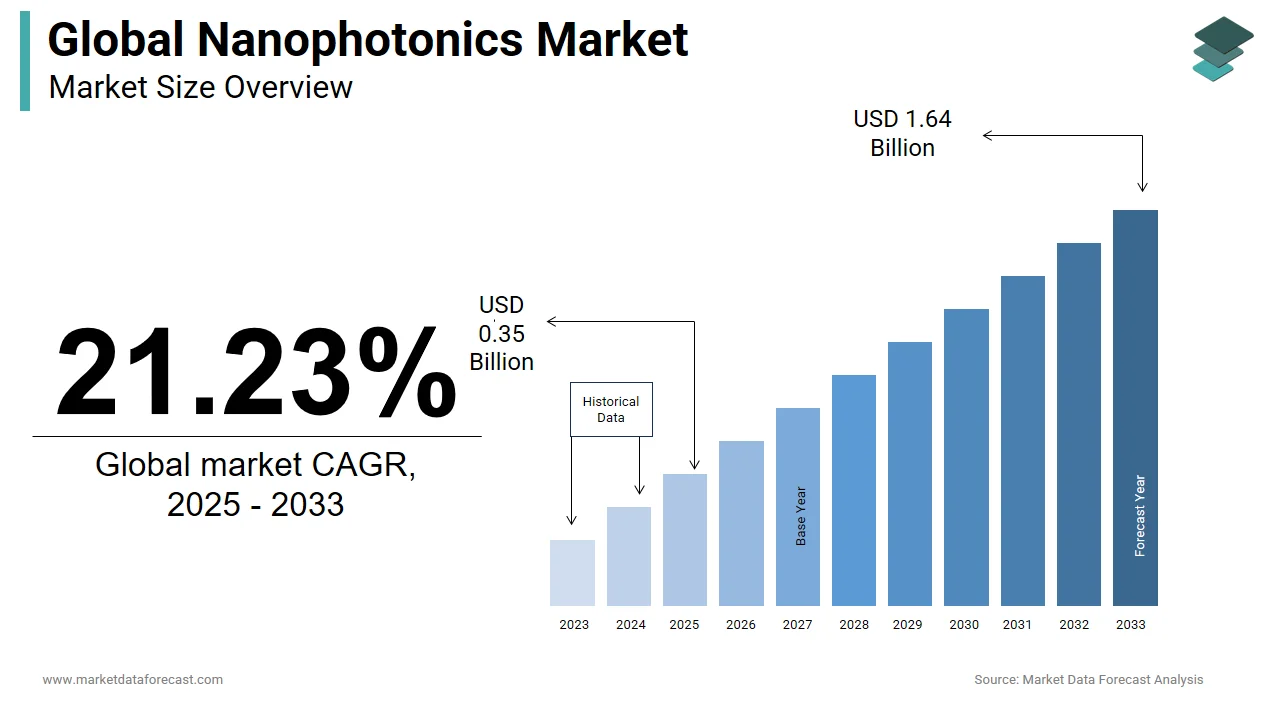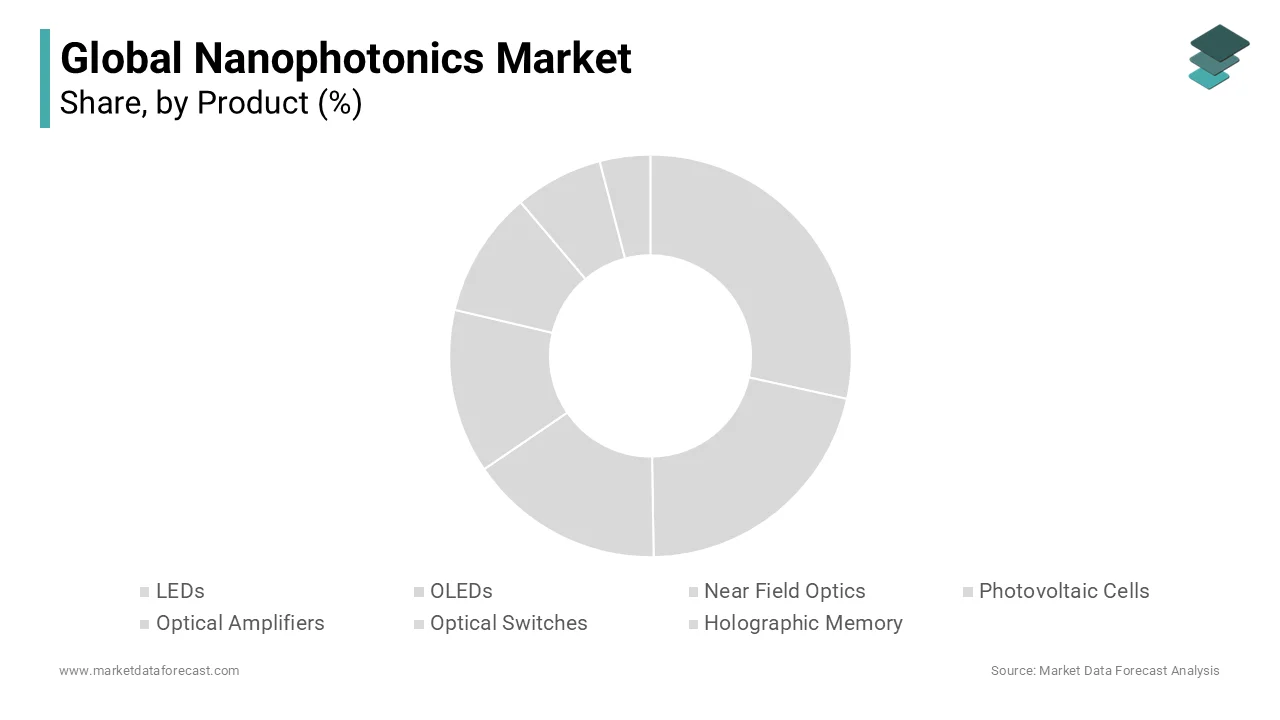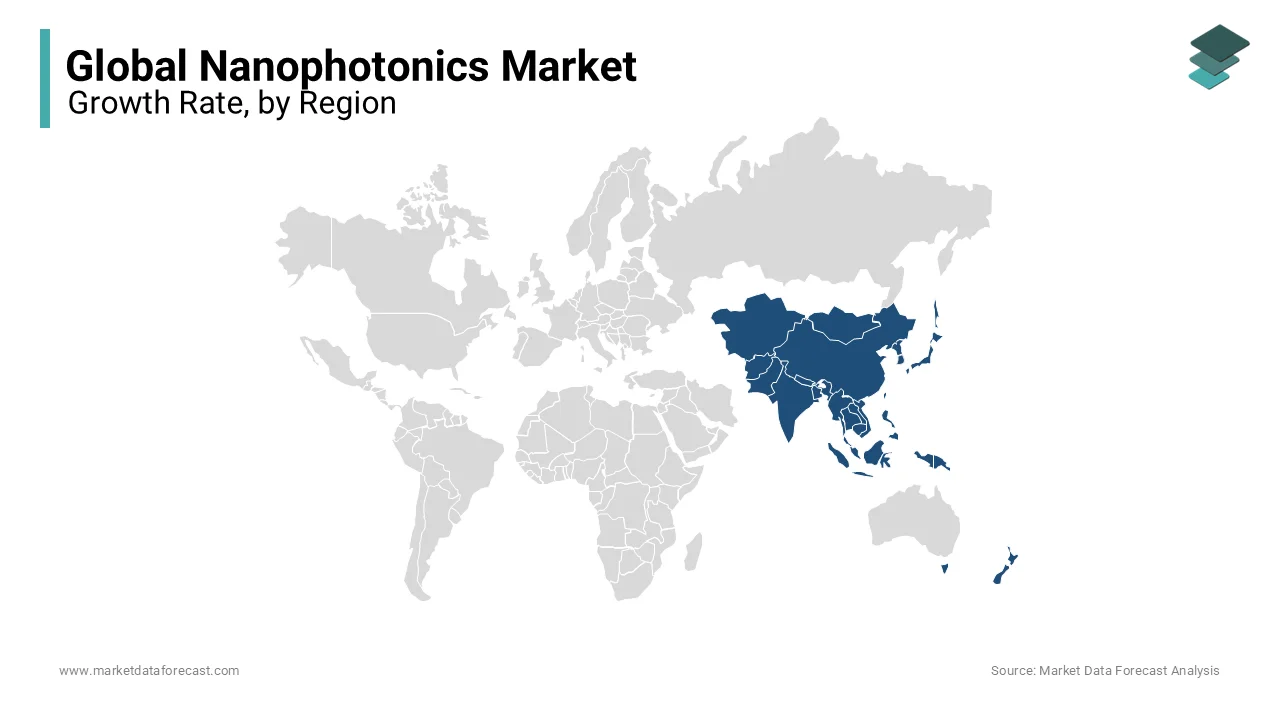Global Nanophotonics Market Size, Share, Trends, Growth Forecast Report – Segmented By Product (LEDs, OLEDs, Near Field Optics, Photovoltaic Cells, Optical Amplifiers, Optical Switches, Holographic Memory), Ingredients (Plasmonics, Quantum Dots, Nanotubes, Nanoribbons, Photonic Crystals), Application (Consumer Electronics, Lighting, Telecommunications, Entertainment, Indicators and Signs, Non-Visual Applications and Others), & Region - Industry Forecast From 2024 to 2032
Global Nanophotonics Market Size (2024 to 2032)
The global nanophotonics market size was worth USD 0.24 billion in 2023. The global market is expected to reach USD 0.29 billion in 2024 and USD 1.35 billion by 2032, growing at a CAGR of 21.23% during the forecast period.

Nanophotonics refers to the application of photonics at the nanometric scale, where the improvement of the field affects the result in different optical phenomena, which bring new functionalities to photonic devices. Photonics, nanotechnology, and increased computing power offer enormous possibilities in all industry verticals.
MARKET DRIVERS
The continued attention of LED/OLED manufacturers to develop devices that consume less energy and offer high luminance efficiency is one of the main drivers for the growth of the global nanophotonics market.
Increased dependence on optical communication and a growing interest in the development of optoelectronic nanomaterials for screens, lasers, and low-cost photovoltaic (PV) photodetectors using quantum dots and nanophosphors are expected to accelerate the growth of the global nanophotonics market in future. The increased investment in research and development on manipulating electron-photons in nanoscale materials to develop innovative photonic devices and other emerging technologies is stimulating the growth of the world market for nanophotonic equipment.
Currently, nanophotonics equipment is available with the combination of three main sciences such as photonics, nanotechnology, and optoelectronics. Many companies plan to increase the gradation of photonics and optoelectronics with nanotechnology. This gradation in nanophotonics should increase the applications of nanophotonics in the electronics industry. Growing applications of nanophotonics bring new capabilities to nanoscale instrumentation. Chemical and biomedical detection, information, and communication technologies should increase their efficiency in operations through nanophotonics. Equipment with new skills is expanding the use of nanophotonics in different industries.
The cost associated with using existing technologies is low compared to photonics. Improving the efficiency of operations in different industries, such as chemical and biomedical detection, contributes to the growth of the global nanophotonics industry. In recent years, the introduction of ultra-thin nanomaterials such as atomic-thin transition metal halides, used in low-sensitivity optical sensors, may open up many new possibilities in detecting environmental gases. Today's nanophotonic applications are continuously improving, contributing to the growth of the global nanophotonics market. Nanophotonics focuses on the use of photonics at the nanoscale. Developing nanophotonic equipment involves designing, manufacturing, and characterizing nanophotonic technology through various applications. Current research and development focus on developing nanophotonic equipment for telecommunications, consumer electronics, and medical care applications.
The main applications of nanophotonic equipment include LEDs, OLEDs, near-field optics, photovoltaic cells, and optical components. The nanophotonic LED is divided into high and flashing LED, UV LED and an alphanumeric LED. UV LEDs have various applications, such as inkjet, a small point-to-point curvature area, and dental applications. With the improvement of the lifespan of LEDs through the use of nanophotonics, the market is expected to grow shortly.
MARKET RESTRAINTS
The lack of awareness of the potential benefits of nanophotonics technology and the high cost of research and development are identified as restrictions that can discourage the growth of the global nanophotonics business.
REPORT COVERAGE
|
REPORT METRIC |
DETAILS |
|
Market Size Available |
2023 to 2032 |
|
Base Year |
2023 |
|
Forecast Period |
2024 to 2032 |
|
CAGR |
21.23% |
|
Segments Covered |
By Product, Ingredients, Application, and Region |
|
Various Analyses Covered |
Global, Regional & Country Level Analysis, Segment-Level Analysis, DROC, PESTLE Analysis, Porter’s Five Forces Analysis, Competitive Landscape, Analyst Overview on Investment Opportunities |
|
Regions Covered |
North America, Europe, APAC, Latin America, Middle East & Africa |
|
Market Leaders Profiled |
Novaled GmbH, OSRAM GmbH, Samsung Sdi Co., Ltd., Seiko Epson Corporation, Sharp Corporation, NEC Display Solutions Ltd., IBM Corporation, General Electric Company, Hitachi, Ltd., Alcatel Lucent, and others. |
SEGMENTAL ANALYSIS
Global Nanophotonics Market Analysis By Product

LED and OLED segments are foreseen to drive the global business in the forecast period, owing to the rise in the adoption of these diodes in consumer electronics and other applications.
Global Nanophotonics Market Analysis By Ingredients
The quantum dots segment accounted for a notable share in the previous years. However, due to applications in areas like solar cells, the plasmonics segment will expand with the highest CAGR in the coming years.
Global Nanophotonics Market Analysis By Application
The consumer electronics segment is the most prominent among all other divisions, likely registering an outstanding market share in the estimated period.
REGIONAL ANALYSIS

The Asia Pacific nanophotonics market, followed by North America and Europe, is expected to dominate the global business in the outlook period. This is due to the continuous focus on the commercialization of nanophotonic technology in various applications and the presence of key manufacturers in the area.
KEY PARTICIPANTS IN THE GLOBAL NANOPHOTONICS MARKET
The major companies operating in the global nanophotonics market include Novaled GmbH, OSRAM GmbH, Samsung Sdi Co., Ltd., Seiko Epson Corporation, Sharp Corporation, NEC Display Solutions Ltd., IBM Corporation, General Electric Company, Hitachi, Ltd. and Alcatel Lucent. These companies constantly focus on R&D investments, mergers and acquisitions, and partnership strategies to gain ground in the global market.
RECENT HAPPENINGS IN THE GLOBAL NANOPHOTONICS MARKET
-
During the latest experiments at the University of Groningen, scientists have used a silver sawtooth to develop a valley-coherent light for nanophotonics, which earlier happened under very low temperatures only. The coherent luminescence can help store or transfer date in quantum electronics.
-
Researchers at the University of Southampton created a new AI neural network to understand the unique 3D flow of light around the nanophotonics. The main agenda of this research is to introduce a technique that can help create optical instruments that can influence and control light movement.
-
Researches from some of the renowned universities of the world have used silicon nanophotonics on a silicon nitride platform to develop a visible light through widely separate optical parametric oscillation, which would offer applications in areas like sensors, spectrometers, metrology systems, and so on.
DETAILED SEGMENTATION OF THE GLOBAL NANOPHOTONICS MARKET INCLUDED IN THIS REPORT
This research report on the global nanophotonics market has been segmented and sub-segmented based on the product, ingredients, application, and region.
By Product
-
LEDs
-
OLEDs
-
Near Field Optics
-
Photovoltaic Cells
-
Optical Amplifiers
-
Optical Switches
-
Holographic Memory
By Ingredients
-
Plasmonics
-
Quantum Dots
-
Nanotubes
-
Nanoribbons
-
Photonic Crystals
By Application
-
Consumer Electronics
-
Telecommunications
-
Lighting
-
Entertainment
-
Indicators and Signs
-
Non-Visual Applications
By Region
-
North America
-
The United States
-
Canada
-
Rest of North America
-
-
Europe
-
The United Kingdom
-
Spain
-
Germany
-
Italy
-
France
-
Rest of Europe
-
-
The Asia Pacific
-
India
-
Japan
-
China
-
Australia
-
Singapore
-
Malaysia
-
South Korea
-
New Zealand
-
Southeast Asia
-
-
Latin America
-
Brazil
-
Argentina
-
Mexico
-
Rest of LATAM
-
-
The Middle East and Africa
-
Saudi Arabia
-
UAE
-
Lebanon
-
Jordan
-
Cyprus
-
Frequently Asked Questions
How does nanophotonics contribute to advancements in healthcare globally?
Nanophotonics plays a crucial role in healthcare by enabling advancements in medical imaging, diagnostics, and therapy. It facilitates the development of highly sensitive biosensors, imaging agents, and targeted drug delivery systems for improved healthcare outcomes.
What are the major trends influencing the nanophotonics market on a global scale?
Major trends in the global nanophotonics market include the integration of nanophotonics in 5G technology, the development of plasmonic devices, and the use of metamaterials for customized optical properties.
How does government support impact the nanophotonics market worldwide?
Government support, including funding for research and development, initiatives to promote technological innovation, and policies encouraging the adoption of nanophotonics, positively impacts the market growth on a global scale.
What role does nanophotonics play in the evolution of quantum computing globally?
Nanophotonics is a key enabler for quantum computing by providing efficient ways to manipulate and transmit quantum information. It contributes to the development of quantum processors and quantum communication systems globally.
Related Reports
Access the study in MULTIPLE FORMATS
Purchase options starting from $ 2500
Didn’t find what you’re looking for?
TALK TO OUR ANALYST TEAM
Need something within your budget?
NO WORRIES! WE GOT YOU COVERED!
Call us on: +1 888 702 9696 (U.S Toll Free)
Write to us: [email protected]